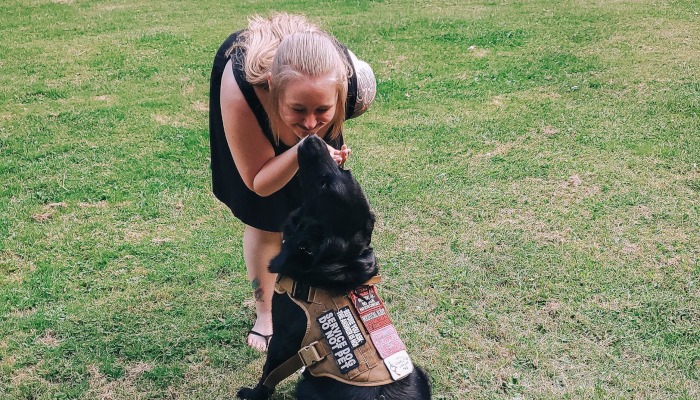
For the past 2 years, I have been trying to obtain my own service dog. It wasn’t until August 2018, though that I came across someone who was actually willing to train one for me. Although my first prospect didn’t work out, it was for the best. Leo and I are both so, so in love with each other.
Leo isn’t just a pet, nor do I consider him one. He is literally my lifeline.
Leo is a task-trained service dog. Specifically, I had him trained to help mitigate my mental illness’ effects and no one else’s. He’s not an emotional support dog nor is he a therapy dog.
The Americans With Disabilities Act only recognizes two types of animals as service animals: dogs and miniature horses. Only service animals count as task-trained animals, and they are the only animals with public access rights.
Most know service dogs as guide dogs – which are wonderful because they help blind people live independent lives. However, they are not the only type of service dogs. Service dogs can help alleviate the effects of mobility impairments, seizure disorders, and mental illnesses such as post-traumatic stress disorder, depression, and anxiety disorders.
On paper, my mental illnesses include major depressive disorder, panic and generalized anxiety disorders associated with paranoia symptoms, post-traumatic stress disorder, insomnia, and borderline personality disorder. They interfere with my daily life and have kept me from living independently for many years.
Shortly after high school, I developed an extreme, irrational fear of going anywhere in public alone. I had to order daily living necessities online. If I had to go to the store, someone had to accompany me. Eventually, at a routine visit, my psychiatrist brought up the possibility of me owning a service dog.
Although Leo wears a vest with visible service dog patches, people still don’t understand that he is considered “medical equipment.”
Up until a week ago, I had never experienced any public access denial from any store or a business owner. But at a routine grocery store outing, Leo and I experienced discrimination for the first time.
We had made it less than 5 feet into the store when a man stopped us. He immediately said that my dog could not enter the building. I responded that since Leo is a service dog, he could legally enter the store. The man then asked for my registration papers, even though laws state that you do not need to provide any registration paperwork. He insisted that if I didn’t have papers, then I couldn’t come inside. He also walked me outside to show me the section of the ADA law they had posted stating that service dogs are the only dogs allowed in the store, which coincidentally was the exact law that allowed Leo and I to shop together.
We came back shortly after with an information card that I typically carry with me to explain what the law actually states. The lady up front said that she had just spoken to the man, who knew he was wrong and was incredibly sorry. She asked what tasks Leo was trained to perform. I answered her and then asked if I could please get what I needed. She then let me shop as if nothing had happened.
The man came out shortly after and genuinely apologized. I told him that I accepted his apology, but that what he did was completely illegal, and he cannot continue to deny other service dog handlers who come into the store. While he walked by me, he pet Leo, which you should never do to a working service dog.
Service dogs are working dogs.
Petting them or trying to get their attention interferes with the work the dogs are trained to perform. It is also illegal to interfere with a service dog while it is working. Anyone who does so can be sued for damages and will most likely lose their entire livelihood.
I don’t know how the misconception of registered service dogs came to be, nor do I understand why it’s so common. But I was denied access simply because I did not provide paperwork that is not even required by law. Leo is the equivalent to a wheelchair for someone who is paralyzed, but when you see a wheelchair user enter a store, you don’t think twice. I don’t know why people see service dogs any differently, and quite frankly, the responses to my service dog are very frustrating. It is pure discrimination to deny someone like me access to a public place simply because my medical equipment happens to be a dog.
Previously Published On The Writer’s Blog, Understanding Chaos
Feature Image Provided by Writer
I appreciate this post for the well-researched web content as well as outstanding phrasing. I got so entailed in this material that I couldn’t stop reviewing.